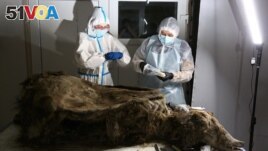26 February 2023
A team of Russian scientists recently examined something extremely unusual: the frozen body of a brown bear that lived thousands of years ago.
The cold preserved the body almost perfectly in the frozen lands of eastern Siberia for almost 3,500 years.
Maxim Cheprasov is the laboratory chief at the Lazarev Mammoth Museum Laboratory at the North-Eastern Federal University in Yakutsk, eastern Siberia. "This find is absolutely unique: the complete body of an ancient brown bear," he said.

Scientists study the body of a brown bear with the geological age of 3,460 years, in Yakutsk, Russia February 21, 2023. (REUTERS/Michil Yakovlev )
In 2020, reindeer herders found the female bear on an island in the Arctic Ocean. Part of the animal was sticking out of the frozen ground, or permafrost, on Bolshoy Lyakhovsky Island. The island is around 4,600 kilometers east of Moscow.
Because it was found just east of the Bolshoy Etherican River, it has been named the Etherican brown bear.
What did the bear eat?
Low temperatures helped preserve the bear's soft tissue for 3,460 years. It also let the scientists know about its final meals - bird feathers and plants. The bear is 1.55 meters tall and weighs nearly 78 kilograms.
"For the first time, a carcass with soft tissues has fallen into the hands of scientists, giving us the opportunity to study the internal organs and examine the brain," said Cheprasov.
The scientific team in Siberia looked at the bear's brain, skin and internal organs so they could study its cells, genes, viruses and other organisms that lived inside it.
Is the bear like other bears today?
"Genetic analysis has shown that the bear does not differ in mitochondrial DNA from the modern bear from the north-east of Russia – Yakutia and Chukotka," Cheprasov said.
He said the bear was about three to four years old when it died from an injury to its back.
It is unclear how the bear came to be on the island, which is now divided from the mainland by a 50-kilometer-wide body of water. It may have crossed over ice, it might have swum over, or the island might still have been part of the mainland.
The Lyakhovsky Islands contain some of the richest treasures in the world for the field of paleontology. The area attracts both scientists and ivory traders hunting for the remains of woolly mammoths, a kind of hairy elephant that disappeared long ago.
I'm Jill Robbins.
Guy Faulconbridge wrote this story for Reuters. Jill Robbins adapted it for Learning English.
_______________________________________________________________________
Words in This Story
preserve – v. to keep undamaged
unique – adj. one of a kind; like no other
herder –n. a person who keeps and raises big groups of animals such as sheep, goats, cattle or reindeer
carcass – n. the body of a dead animal
mitochondrial DNA – n. DNA found in mitochondria, which contains some structural genes and is inherited only through the female line
paleontology – n. the science of the forms of life existing in former geologic periods, as represented by their fossils